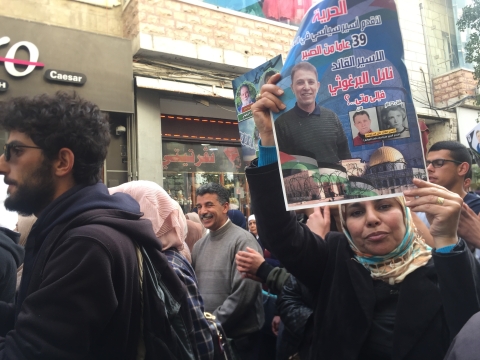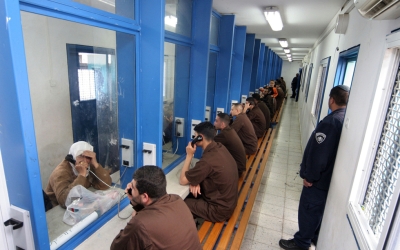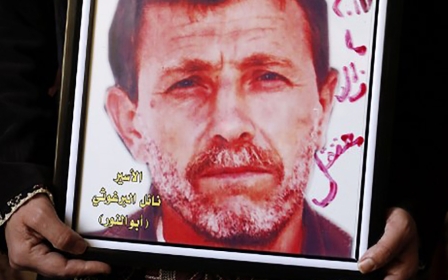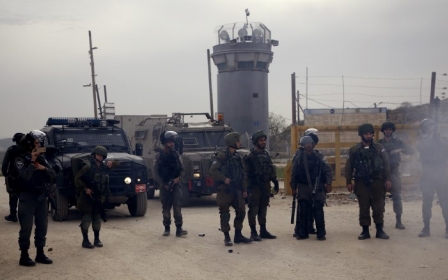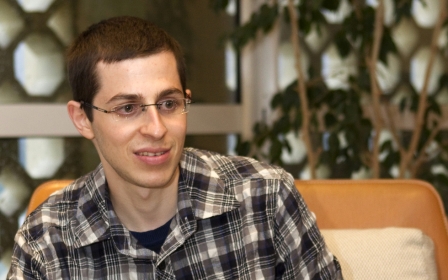Israel court hope for Palestinian prisoners rearrested after Gilad Shalit swap

In 2009, Nael Barghouti became the longest-serving political prisoner in the world. Sentenced in 1978 for allegedly killing an Israeli officer, he languished in jail for decades until his release in the Gilad Shalit prisoner swap in 2011.
He was one of 1,027 Palestinian prisoners released in exchange for the soldier, who was kidnapped by Hamas in the 2006 war on Gaza.
'I have a lot of faith that the Israeli court will make a decision in our favour and in favour of all the prisoners'
- Eman Nafi, Nael Barghouti's wife
But after just a few years of freedom, he was detained again, along with more than 50 others released in the swap, in a mass re-arrest following the murder of three Israeli teenagers in June 2014.
Despite having no direct connection to the teenagers' murders and rearrest being in clear violation of Israel's terms, dozens of those held remain in jail with Barghouti who marks his 39th year behind bars this year.
Now, however, he and his fellow inmates have been given a rare glimmer of hope.
New MEE newsletter: Jerusalem Dispatch
Sign up to get the latest insights and analysis on Israel-Palestine, alongside Turkey Unpacked and other MEE newsletters
In February, a petition was filed to Israel’s High Court, demanding their release. It states their re-arrest was wholly political, unrelated to any violation of their terms of release, and in violation of Israel’s own international agreements.
Avigdor Feldman, an Israeli attorney, filed the petition with the consent of 31 of the prisoners and a ruling could be issued within months.
For Barghouti’s wife, Eman Nafi, the petition follows years of struggle. A former prisoner of ten years herself, she married Barghouti during his brief release in 2011 and has spent only 33 months with her husband.
“I have a lot of faith that the Israeli court will make a decision in our favour and in favour of all the prisoners... and that life will return to normal,” the 52-year-old told Middle East Eye.
“The court has not yet set a date for a hearing, but the lawyer believes it will happen soon.”
The petition - lodged with the High Court and reported by Haaretz - argues that the re-arrest of prisoners was based on lobbying from Israeli politicians. Included in the evidence for the claim is a post by Jewish Home Minister Ayelet Shaked, who says her party's leader, Naftali Bennett, demanded the arrests which were “to hurt the terrorists and to pressure their families".
"To this day most of them are rotting in prison and that is the most painful thing for Hamas," Shaked wrote of the inmates. "That’s how you affect change."
‘I want to be free while my grandchildren are young’
Laila Shalash, who is also heading to the Supreme Court, told MEE that the families do not have much information but are hoping to obtain a positive ruling for the prisoners.
Her husband Ibrahim, 49, was given a life sentence plus 35 years for being a member of the Qassam Brigades, Hamas's armed wing. He has spent 25 years in jail, about half of his life. Only five years have been spent with his wife.
During that time, the couple had four children: Eman and Zaid, who were born before Ibrahim was initially jailed, and twins Musab and Malik, born on the same day he was re-incarcerated.
“Eman is now married and with children,” Laila told MEE. “And we are preparing for Zaid’s wedding. Their father is still in prison - he has not been able to be present during any stages of their lives. But I have much hope that Ibrahim will be able to attend Zaid’s wedding.”
From her home in a village close to Ramallah, Laila says her husband's re-arrest caused her to "lose her mind".
“We felt serious injustice. We were trying to live a normal life and had moved into a new home. All Ibrahim was interested in was farming and the land,” she said.
“These days he always asks about spring and how our trees look. He used to sit under the trees on our land, and ponder nature for hours. After his re-arrest, I would sit in his favourite spot, screaming and crying.”
'After his re-arrest, I would sit in his favorite spot, screaming and crying'
-Laila Shalash
She recalled what he tells her when she visits him in Nafha prison: “I want to be free while my grandchildren are young; I want to get a chance to raise them and play with them since I was deprived of raising my own children.”
Another prisoner, Nidal Zalloum, married his wife, Ikram, immediately after he was released in the Shalit prisoner exchange. He had been jailed for his involvement in a 1989 stabbing in Jerusalem.
With Ikram, Nidal had two daughters, Fadwa and Jana. While he was behind bars following his re-arrest, Nidal managed to smuggle his sperm out of prison: his third daughter, Hiba, is now a year and a half.
“Fadwa was two years old when her father was imprisoned. She was very attached to him and did not understand why he was away from her. It was very difficult for me to try to explain to her that her father is in prison,” Ikram told MEE.
Nidal sees his three daughters once a month and is allowed to hold them once every two months for ten minutes under prison visitation laws.
“Nidal did not live with his daughters, who miss him dearly, and are still too young to comprehend his absence,” Ikram said. “We dream that he will be released and returns home quickly.”
Hamas-Israel deal?
Despite the family’s hopes, however, the petition has been the subject of scrutiny, and some are suspicious that the legal step may be linked to Israeli pressure for a new prisoner exchange deal between Hamas and Israel.
Hamas denies this and has insisted that no negotiations for a new deal have been taking place with Israel.
“There is no connection between their decision and any political negotiations,” Mousa Doudin, the Hamas official in charge of prisoner issues, told MEE. “It is a legal step that is merely a continuation of previous measures taken to challenge their original unjust sentences in Israeli courts.”
The “rumours” circulated about a potential exchange deal, Doudin claims, serve as an attempt to obstruct prisoners' moves against the Israeli authorities.
“There is a plan by the prisoners to undergo a resistance project against the aggression of the Israeli prison authorities. And there are expectations that there will be popular Palestinian sympathy,” he said.
“Because of this, rumours are being leaked about the process of an exchange deal to thwart the prisoners’ plans.”
Doudin said that although several mediators had approached Hamas in an attempt to intervene, the group would not agree to negotiations unless talks started from the point where the first deal ended - that is, until all the re-arrested prisoners had been released.
“We will not back down on this demand,” he said. “If the occupation [Israel] wants a real shift in the issue of prisoners, it must restore the situation to its right place before starting to speak of a new deal.”
Fuad al-Khafsh, the director of Ahrar Center for Prisoner Studies and Human Rights, believes Israel aimed to “punish the Hamas movement” with the 2014 arrest campaign.
“These prisoners are a bargaining chip in Israel’s hands, which it uses to negotiate and exchange them with the soldiers being held by Hamas in Gaza,” al-Khafsh told MEE.
Dealing with the Shalit swap
In making the case that Barghouti and his fellow prisoners were jailed again for political reasons, the petition confronts attempts by Israel to legalise the practice of re-arresting prisoners in violation of their own agreements.
In 2009, the Israeli military issued an order allowing prisoners released in a swap to be re-detained on the instruction of a military committee and on the basis of information not disclosed to the prisoner or his lawyer. And in 2014, an Israeli ministerial committee approved a “conditional release of prisoners” bill, that allowed for re-imprisonment of released detainees under the basis of secret evidence.
Enas Zeid, the head of the Euro-Mediterranean Human Rights Monitor, told MEE that the legality of these orders is highly dubious. Arrest on the basis of secret information constitutes a clear violation of the right to a fair trial, as affirmed in the Fourth Geneva Convention.
The re-arrest of released political prisoners, furthermore, is illegal under Article 14 of the International Covenant on Civil and Political Rights.
“The international community and human rights institutions are called upon to condemn Israel’s actions in violating the deal, which was sponsored by an official mediator,” she said, highlighting that no international bodies, nor Egypt which sponsored the deal, have commented on rearrests.
“Egypt must also act according to the terms of the agreement and compel Israel to abide by it.”
Zeid is anxious, however, when it comes to the petition to the Supreme Court. She fears that if the appeal, already lodged with Israel’s highest judicial authority, is rejected, it could legitimise the rearrest of prisoners, setting a precedent for further redetentions.
For Eman Nafi and the other families of prisoners, however, the petition is a chance. While they recognise the risk, they told MEE they are optimistic about the possibility of their appeal - and hope it will bring a new life for their relatives detained when they believed they were free.
Middle East Eye delivers independent and unrivalled coverage and analysis of the Middle East, North Africa and beyond. To learn more about republishing this content and the associated fees, please fill out this form. More about MEE can be found here.


